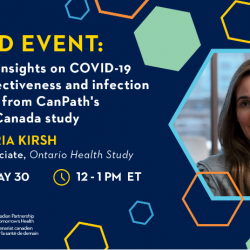Dr. Victoria Kirsh presented at a CanPath webinar this week to present results from the SUPPORT-Canada study, funded by the federal COVID-19 Immunity Task Force (CITF). Data and blood spot samples were used from 22,300 participants from Atlantic PATH, CARTaGENE, the Ontario Health Study, Manitoba Tomorrow Project, Alberta’s Tomorrow Project, and BC Generations. Key findings include: 62% of participants had a COVID-19 infection based on anti-N measured antibody levels. Among those, 86% did not suspect they had ever had COVID-19. 95% of the COVID-19 infections were observed during the Omicron period. Risk of infection was increased among younger individuals, males, essential workers, and those who travelled. Participants with a reported COVID-19 infection reported symptoms from mild to severe, but few required hospitalization. The effectiveness of full or booster vaccination in preventing COVID-19 Omicron infection is short-term, only lasting 4 months. Time since last dose is a more important determinant of protection against infection than the number of doses. Antibody levels are correlates of vaccine-induced protection. Prior COVID-19 infection protects against reinfection for 8 months. The CanPath SUPPORT-Canada study has provided important findings related to the COVID-19 pandemic, vaccines and infections. With only 4 months of protection, these findings suggest that booster campaigns could be strategically used to rapidly boost immunity before upcoming waves of infection. Further, the longitudinal nature of CanPath participants ensures that we have a nationally representative population that can be followed for years to come (e.g., impact of Long COVID, future vaccinations, etc.). Link to recorded webinar: To come Link to webinar slide deck: https://www.covid19immunitytaskforce.ca/wp-content/uploads/2023/05/canpath-webinar-may-2023.pdf Link to CITF’s post: https://www.covid19immunitytaskforce.ca/most-canpath-study-participants-had-infection-acquired-antibodies-but-few-suspected-covid-19/





